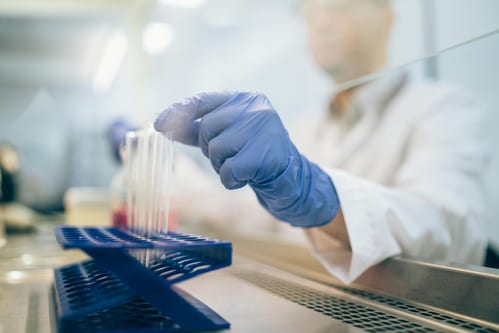Malaysia is a major producer of medical gloves which are supplied across the globe, including to the UK’s National Health Service (NHS). Evidence, including one produced by a Modern Slavery PEC-funded project, points to systemic forced labour issues present in the medical supply chains. Migrant workers, who dominate the Malaysian glove production, often have to take out loans to pay high recruitment fees (sometimes amounting to thousands of US dollars) in order to obtain jobs in the sector, leaving them tied to their employer at least until their debts are repaid.
Some Malaysian companies came under strong international pressure in recent years, particularly from the US after it deemed their products being produced with the use of forced labour and banning them from entering the American market. Some of the companies responded by repaying the recruitment fees to the workers and introducing the Employer Pays Principle (EPP) - a mechanism created by the Institute for Human Rights and Business (IHRB) committing employers to pay the full costs associated with labour recruitment.
However, little is known about how precisely EPP strategies have been implemented or their real impacts on workers, especially in the longer term. Little is also known about the returns of these efforts for the affected companies, which is important for driving sustainable change.
A research project carried out by a partnership of the Brighton and Sussex Medical School at the University of Sussex, Newcastle University, Impactt Limited and Unseen UK, is evaluating the effectiveness of this specific intervention – the EPP – in preventing debt bondage as a key driver of exploitation and other indicators of forced labour, including restriction on movement and abusive working and living conditions. The project is paying particular attention to the sustainability of these interventions and how suppliers and procurement practitioners – including those in the UK’s NHS – can better understand and require them in their procurement contracts as interventions preventing forced labour in their supply chains.
The researchers are assessing the current labour recruitment and working practices in the Malaysian gloves sector and comparing them against the data produced by the previous PEC-funded project in 2021. These include surveying and interviewing the workers on whether they are paying recruitment fees, how much, and potential changes in their living and working conditions, as well as interviewing glove company managers to explore their views on the implementation, costs and benefits of EPP in their businesses.
The research team is also holding three workshops focused on glove industry actors, suppliers and procurement teams, and UK policymakers, as well as a workshop with international government officials responsible for healthcare procurement, to discuss the empirical research findings and recommendations as a basis for establishing what is working most effectively for the prevention of forced labour in the medical supply chains.
Research team: Dr Mei Trueba & Dr James Brown (Brighton and Sussex Medical School and University of Sussex), Prof Alex Hughes (Newcastle University), Hilary Agg (Unseen UK), Ben Bostock & Louis Prosser (Impactt Limited).
The project is further supported by four anonymous individuals with lived experience of labour exploitation. These experts-by-experience are playing an integral role in shaping the project, contributing to the design of data collection tools, as well as in data collection, data analysis and in the dissemination of findings.
This project was funded as part of the Modern Slavery PEC call for research on the effectiveness of interventions to prevent modern slavery.




